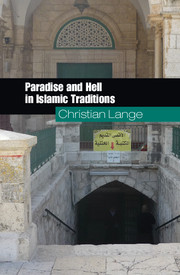Book contents
- Frontmatter
- Dedication
- Contents
- List of Figures
- List of Table and Charts
- Acknowledgements
- List of Abbreviations
- Note on Dates, Citation, Translations, and Transliteration
- Introduction
- Part I Textual Foundations: Narrating the Otherworld
- Part II Discourses and Practices: Debating the Otherworld
- Epilogue
- Primary Sources
- Secondary Sources
- Index of Names
- Index of Terms
Epilogue
Published online by Cambridge University Press: 05 December 2015
- Frontmatter
- Dedication
- Contents
- List of Figures
- List of Table and Charts
- Acknowledgements
- List of Abbreviations
- Note on Dates, Citation, Translations, and Transliteration
- Introduction
- Part I Textual Foundations: Narrating the Otherworld
- Part II Discourses and Practices: Debating the Otherworld
- Epilogue
- Primary Sources
- Secondary Sources
- Index of Names
- Index of Terms
Summary
I looked around hell, and didn't see
an ignorant person, or one who wasn't thoughtful.
For the ignorant dwell in the Gardens …
Jamīl Ṣidqī al-Zahāwī, Thawra fī l-jaḥīm
When, in 1931, the Iraqi poet and philosopher Jamīl Ṣidqī al-Zahāwī (d. 1936) published his satirical poem, Revolution in Hell (Thawra fī l-jaḥīm), he met with public outrage. From the pulpits in Baghdad, al-Zahāwī was denounced as a heretic and atheist. According to al-Zahāwī's visionary tour of the otherworld, which is presented as a dream occasioned by a dish seasoned with watercress, hell is where the philosophers and rationalists are, the forward-thinking spirits that Islam traditionally condemns to eternal punishment: Avicenna, Ibn Rushd, and Naṣīr al-Dīn Ṭūsī, but also Socrates, Epicurus, Voltaire, and Spinoza, to name just a few. Fired up by the passionate address of a young revolutionary, and with the aid of infernal weaponry developed by a group of empirical scientists, the inhabitants of hell storm heaven and threaten to topple God's Throne. At that moment, the poet wakes up.
Modern Continuities and Discontinuities
While al-Zahāwī frames his poem in modern, scientific terms, his irreverent attitude towards traditional eschatology is hardly novel. Revolution in Hell gestures back to earlier literary tours of the otherworld, in particular al-Maʿarrī's (Syria, d. 449/1058) The Epistle of Forgiveness (Risālat al-ghufrān) and al-Wahrānī's (d. 575/1179) The Great Dream (al-Manām al-aʿẓam). In certain respects, al-Zahāwī's two medieval forerunners even surpass him in their outré brazenness and penchant for provocation. Al-Zahāwī imagines the houris in paradise with slender waists and backsides “so heavy that they can hardly move them,” but in al-Maʿarrī's ironic take on the topic, the posterior of one of the heavenly maidens is enlarged to the size of hills, whereupon the protagonist of his narrative, the Aleppine poet Ibn al-Qāriḥ, entreats God “to reduce the bum of this damsel to one square mile, for Thou hast surpassed my expectations with Thy measure!” The angels of the grave, in al-Zahāwī's poem, torture the poet when he declares his belief in God as an abstract natural principle, “ether” (athīr).
- Type
- Chapter
- Information
- Paradise and Hell in Islamic Traditions , pp. 279 - 290Publisher: Cambridge University PressPrint publication year: 2015



